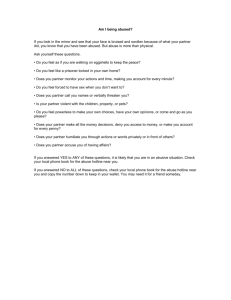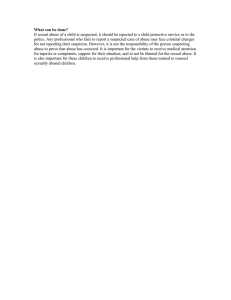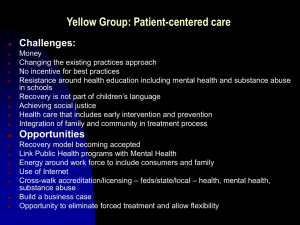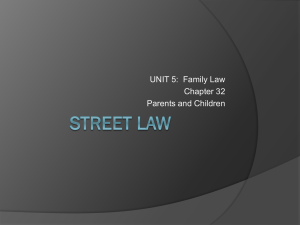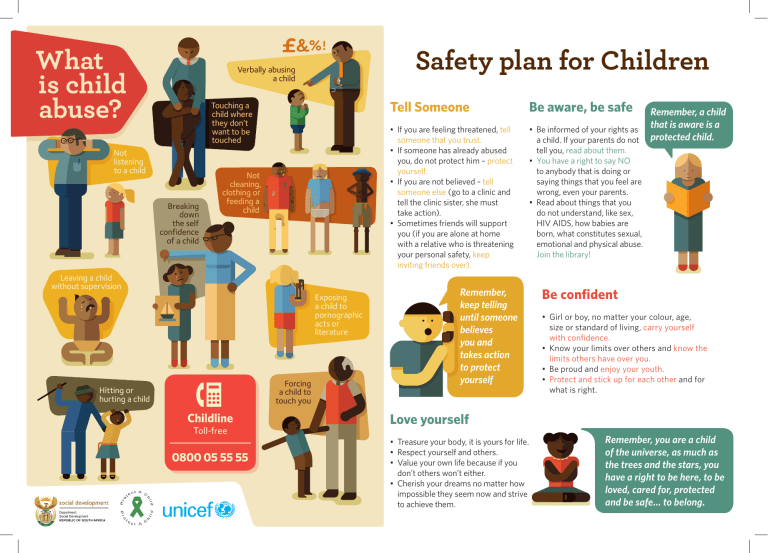
What is child abuse? Safety plan for Children Verbally abusing a child Touching a child where they don’t want to be touched Not listening to a child Breaking down the self confidence of a child Not cleaning, clothing or feeding a child Leaving a child without supervision Exposing a child to pornographic acts or literature Forcing a child to touch you Hitting or hurting a child Childline Toll-free 0800 05 55 55 Tell Someone Be aware, be safe • If you are feeling threatened, tell someone that you trust. • If someone has already abused you, do not protect him – protect yourself. • If you are not believed – tell someone else (go to a clinic and tell the clinic sister, she must take action). • Sometimes friends will support you (if you are alone at home with a relative who is threatening your personal safety, keep inviting friends over). • Be informed of your rights as a child. If your parents do not tell you, read about them. • You have a right to say NO to anybody that is doing or saying things that you feel are wrong, even your parents. • Read about things that you do not understand, like sex, HIV AIDS, how babies are born, what constitutes sexual, emotional and physical abuse. Join the library! Remember, keep telling until someone believes you and takes action to protect yourself Remember, a child that is aware is a protected child. Be confident • Girl or boy, no matter your colour, age, size or standard of living, carry yourself with confidence. • Know your limits over others and know the limits others have over you. • Be proud and enjoy your youth. • Protect and stick up for each other and for what is right. Love yourself • Treasure your body, it is yours for life. • Respect yourself and others. • Value your own life because if you don’t others won’t either. • Cherish your dreams no matter how impossible they seem now and strive to achieve them. Remember, you are a child of the universe, as much as the trees and the stars, you have a right to be here, to be loved, cared for, protected and be safe… to belong. Protecting children is everybody’s business How you can prevent child abuse: • Form a neighbourhood group to focus on child protection. • Foster mutual respect and good communication between children and parents. • Look for positive ways to bring up children. • Inform parents and children about their rights as citizens. • Watch your neighbour’s children when they have to go somewhere. contributing to child abuse, such as poverty, life skills, unemployment. • Make use of resources provided by existing organisations in your areas. • Lobby local, provincial and national government for adequate environments and essential services e.g., housing, water, sanitation, and playgrounds. • Form links and reach out to families in difficult circumstances. • Have neighbour’s children check with you when they come home if their parents are not there. • Keep an eye out for strangers or strange cars. • Keep an eye on your neighbour’s house if they are away. • Talk to children in your neighbourhood about where they can go for help. • Establish safe homes and safety networks with organisations in your area. • Spread the idea of good neighbourliness. • Establish neighbourhood support groups for abused children and their families. • Establish links and networks with formal services. • Organise neighbourhood awareness campaigns. • Organise activities to improve your neighbourhood that address issues How you can intervene in child abuse: • Check situations out if • In case of rape, secure any evidence. they look suspicious. • Get assistance from other neighbours. • Call the police if a child is in danger. • Become safety parents. • Report cases and act in collaboration • Offer support and assistance to parents with relevant authorities. and children who have been abused. • When taking a child to the police, insist on a case number. • Provide support to your How to respond to child abuse • Have respect for your neighbours. • Child abuse should never be tolerated. • Prevention of abuse is everyone;s responsibility. • Be child-friendly adults. • Children are entitled to human rights • It’s never too late to help. • Believe children. neighbour in times of emergency, offer a meal, call the ambulance • Don’t ask the child too many questions. • Give information to neighbours on child support grants, disability grants, and where to go if a child is abused. • Perpetrators of abuse have committed a crime. • The behaviour of perpetrators can be changed. • Being a good neighbour has limits, don’t let it be an extra burden. • Always act in the best interest of the child. • Be crime-free. • Child protection starts at home and with one’s own family.
